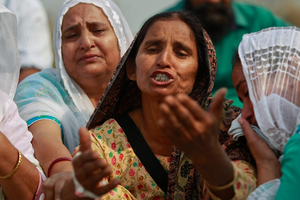India, Pakistan skirmish on border: What does it mean?
As many as 19 people have been reported killed as India and Pakistan trade fire across their border.

The mother of an Indian woman Rajinder Kaur, who was killed in Pakistani shelling, wails during her funeral at Khour village in Ramgarh sector, Samba district of Jammu and Kashmir, India, Tuesday.
Channi Anand/AP
At least 19 people have been killed as a result of India-Pakistan border disputes in Kashmir that have occurred in recent weeks, prompting some to wonder if the conflict could escalate into a drastic war over control of the region.
Tensions between the two nations have run high since Indian officials killed a Pakistani militant commander in the area. Then, last month, 19 soldiers were killed on an army base in India. Both nations have denied responsibility for bringing the first strike, and leaders in each country have accused the other of violating a 2003 ceasefire agreement that curbed violence in the area.
India says that seven civilians, including two children, died Tuesday following cross-border firings. Officials have evacuated several civilian villages along the disputed border region and moved them into government-operated shelters for their protection. In Pakistan, more than 10 people were killed over the weekend and Monday.
"It appears as if a full blown war is going on between India and Pakistan," Mohammad Saeed, a resident of the village of Mohra in the region, told Reuters. "Please have mercy and stop it.”
Armies from each nation patrol the Line of Control, which divides Kashmir into two separately governed regions. Cross-border firings between officials of the two nations continued Tuesday, officials confirmed.
Such disputes have led to two of the three wars between the nations in the last 70 years. As decades of tension continue to mount, some young Kashmiri men are joining militant forces to fight India, seeking a route to self-determination for the region after years of frustration and oppression.
“This time the uprising has spread to every artery and vein of Kashmir,” Parvez Imroz, a human rights lawyer in Srinagar, the largest city in Kashmir, told the Los Angeles Times. “This is the third generation of Kashmiris since 1947, and their anger is such that they don’t want to budge.”
Now, some worry that the stakes have become so high and the region so volatile that conflict could escalate into a nuclear exchange over the territory.
But other nonviolent tactics are at play in the conflict as well. India has threatened to skirt the provisions of a water treaty that regulates how the two nations share resources from three rivers by constructing two hydropower plants that would divert more water to India. Experts have criticized the tactic, and Pakistan has responded by saying it would consider a violation of the treaty to be “an act of war or a hostile act against Pakistan.”
"It's highly irresponsible on part of India to even consider revocation of the Indus Water Treaty," Sartaj Aziz, foreign policy adviser to Pakistani Prime Minister Nawaz Sharif, said last month. "Threats of a water war are part of a military, economic and diplomatic campaign to build pressure on Pakistan."
Each nation also expelled a diplomat last week when tensions rose to a government level.
The decades-old conflict has left those in Kashmir disenchanted with politics between the two nations and apt to support rogue militant causes. As protests continue in the region, some say militant groups, and local support for them, could continue to grow in response to government actions.
“People have lost faith in the political struggle,” Shujaat Bukhari, editor of Rising Kashmir, an independent newspaper, told the Los Angeles Times. “I’m not saying everyone in Kashmir is a militant. But everyone sympathizes with the militancy, and that is a new reality.”
This report contains material from the Associated Press and Reuters.

